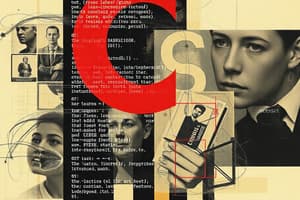Podcast
Questions and Answers
How do you declare a variable in C?
How do you declare a variable in C?
Use the format: data_type variable_name;
What are the three primary types of variables in C programming?
What are the three primary types of variables in C programming?
int, float, char
How are pointers represented in C programming?
How are pointers represented in C programming?
By an asterisk (*) followed by a variable name
What are functions in C programming?
What are functions in C programming?
Flashcards are hidden until you start studying
Study Notes
Diving into C: A Comprehensive Guide to C Programming Language
As a popular and widely-used programming language since its inception in 1972, C has proven to be an essential tool for developers worldwide. In this article, we'll delve into various aspects of C programming, focusing on variables, functions, pointers, operators and expressions, control structures, and strings.
1. Variables
In C, variables are containers that hold values. There are primarily three types of variables:
- int: Stores integer values.
- float: Stores floating-point values.
- char: Stores single characters.
In C, variable names should be meaningful and descriptive. To declare a variable, use the data_type variable_name; format. For example, int my_age; declares an integer variable named my_age.
2. Functions
Functions are self-contained blocks of code that perform specific tasks. Declaring a function follows the return_type function_name(parameter_list) { function_body; } format. For example, int add_numbers(int x, int y) { return x + y; } declares a function named add_numbers that returns an integer and takes two integers as arguments.
3. Pointers
Pointers enable developers to manipulate memory addresses directly. They're represented by an asterisk (*) followed by a variable name. For example, int* my_pointer; declares a pointer variable named my_pointer. To access the value stored at a pointer's address, use the * operator.
4. Operators and Expressions
C offers a range of operators for arithmetic, logical, relational, and bitwise operations. The common operators include:
+: Addition-: Subtraction*: Multiplication/: Division%: Modulo&&: Logical AND||: Logical OR==: Equality!=: Inequality>: Greater than<: Less than>=: Greater than or equal<=: Less than or equal&: Bitwise AND|: Bitwise OR^: Bitwise XOR~: Bitwise NOT
5. Control Structures
Control structures enable developers to control the flow of a program. C features the following control structures:
- if: Conditionally executes code based on a condition's truth value.
- if-else: Conditionally executes code based on a condition's truth value and provides an alternative block of code to be executed if the condition is false.
- switch: Executes one of several code blocks based on the value of an expression.
- while: Executes a block of code repeatedly while a condition is true.
- do-while: Executes a block of code repeatedly, with the condition checked at the end of the block.
- for: Executes a block of code repeatedly for a given number of iterations or based on a condition.
6. Strings
In C, strings are treated as arrays of characters, terminated by a null character ('\0'). C doesn't have native support for string-handling functions like concatenation, but offers standard libraries (such as <string.h>) that provide these features.
Understanding C programming language and these subtopics will make it easier to write efficient and reliable programs. With its wide use in various industries, C remains an invaluable tool for developers worldwide.
Learn more about C programming and practice writing C programs to strengthen your understanding of the language.
Studying That Suits You
Use AI to generate personalized quizzes and flashcards to suit your learning preferences.




